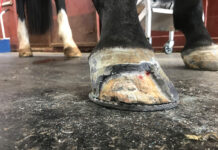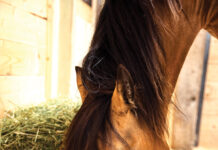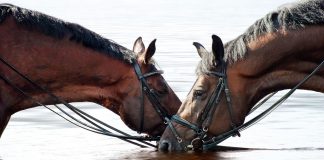
Q. Can you give me a general rule to follow when making a feed change? I know I need to gradually make the change, but I’m not sure how slow to go with it.
For the addition of feed supplements like soaked beet pulp, complete feed pellets, grain, or fat in the form of oil or rice bran, a general rule suggests taking two to three weeks to alter the diet to the full amount of the newly desired ration. For example, you might start with a small amount of complete feed pellets, say half a pound twice a day, then add that much again every five days to slowly work up to the end ration. So for each meal, on days one through four, the horse receives half a pound; on days five through 10, he gets 1 pound; on days 10 through 15, he gets 11/2 pounds; and by day 20, he is receiving 2 pounds. If your target amount is greater, say 4 to 6 pounds, you might increase steadily, but cautiously, every three days with the full amount reached in three to four weeks.
During this transition period, if you notice any signs of loose stool or diarrhea, cut back on the amount of new/different food offered, and give your horse another few days of adjustment before once again increasing his amount of feed. Most horses easily make a feed adjustment, especially if you blend the new ration in with the feeds to which they are accustomed. It is best to feed by weight, rather than volume, for better accuracy.
Further Reading
Equine Nutrition Fact or Fiction
Meeting Your Horse’s Nutritional Needs
Nancy S. Loving, DVM, is a performance horse veterinarian based in Boulder, Colo. She is also the author of All Horse Systems Go.






I NEED HELP!! My senior horse just got a rapid weight loss. I took her to the vet and he said she has lost alot of teeth and told me to soften up her food. I dont know what to soften it with. HELP!! I love her and dont want to lose her.
This seems like a great plan but if my horse gets 15 cups (about 4.5 pounds) of a mixture of stretcher and senior feed, wouldn’t this take more than 3 weeks? I need to get him off hay and onto a complete feed asap as he has diarrhea which I think is caused by hay or current feed.
THAT’S ALL!!!!!!